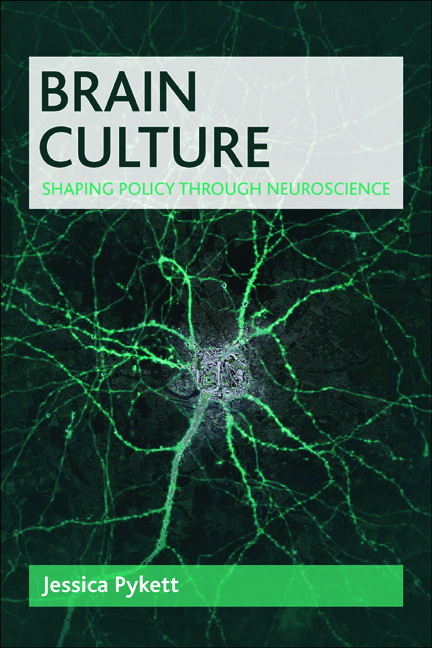Book contents
- Frontmatter
- Dedication
- Contents
- About the author
- Acknowledgements
- Preface
- One Introduction: governing through brain culture
- two Brain culture in context
- three Designing cerebral cities
- four Teaching the learning brain
- five Managing workplace emotions
- six Conclusion: what is at stake in the brain world?
- References
- Index
five - Managing workplace emotions
Published online by Cambridge University Press: 10 March 2022
- Frontmatter
- Dedication
- Contents
- About the author
- Acknowledgements
- Preface
- One Introduction: governing through brain culture
- two Brain culture in context
- three Designing cerebral cities
- four Teaching the learning brain
- five Managing workplace emotions
- six Conclusion: what is at stake in the brain world?
- References
- Index
Summary
Positive psychology is psychology – psychology is science – and science requires checking theories against evidence. Accordingly, positive psychology is not to be confused with untested self-help, footless affirmation, or secular religion no matter how good these make us feel. (Nathan, 2009, p xxiii)
Introduction
Happiness, positive emotion, life satisfaction and wellbeing have become important focal points for UK public policy since the turn of the 21st century. At the heart of this policy enthusiasm are developments in the scientific study of these phenomena. In 2005, influential economist Lord Layard published a book, Happiness: Lessons from a new science (Layard, 2005), which has had a significant impact on public policy in the UK and beyond. It brought to public attention the so-called Easterlin paradox. In the 1970s, economist Richard Easterlin had highlighted that despite ongoing economic growth in the US, the overall reported happiness of its population had not increased. Indeed, as others would have it, advanced industrialised nations with the highest GDPs in the world are suffering from a psychological malaise of ‘affluenza’ (James, 2007). In other words, wealth should no longer be regarded as a guarantor of wellbeing.
Soon after, the UK's Office for National Statistics (ONS) embarked on an ambitious programme for the development of measures of societal wellbeing (Allin, 2007), while the OECD held a world forum on how best to measure societal progress as distinct from GDP. In 2009, an influential report was published by the former French President Nikolas Sarkozy's Commission on the Measurement of Economic Performance and Social Progress (Stiglitz et al, 2009), setting out the inadequacies of GDP measures. The report also recognised that public policy decisions are most often made in relation to that which is measurable, and thus, that having solid metrics for the sustainability of growth and wider social progress would be essential for governments seeking to evade future (financial, economic, environmental and social) crises. Numerous think tanks and civil society organisations, such as the New Economics Foundation (nef) and Action for Happiness in the UK, the Spinoza Fabrique in France, The State of the USA, Inc in the US, and PerCapita in Australia have focused some of their activities on the difficulties of conceptualising, measuring and intervention for wellbeing.
- Type
- Chapter
- Information
- Brain CultureShaping Policy through Neuroscience, pp. 139 - 170Publisher: Bristol University PressPrint publication year: 2015



